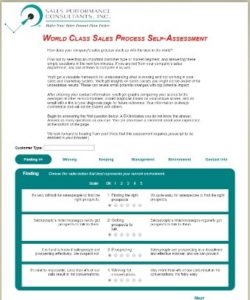New Self-Assessment Creates a Sturdy Foundation for Improvement
More often than not, the term “sales process” creates more problems than it solves. Over the years, I’ll bet you’ve heard plenty of people use it to talk past each other. They use the term to means things like:
- What salespeople do to their prospects and customers
- “Best practices” salespeople are supposed to use, such as in sales training or CRM
- Everything a business does to find, win, and keep customers
The difficulties stem from the hidden assumptions people make. For instance:
- Sales work is not something salespeople do “to” their prospects.
This might be true if prospects don’t have much choice about being sold to. It might even be appropriate, as when people need a little help doing things that are good for them (life insurance, anyone?) However, proper sales work requires that customers voluntarily participate, especially in B2B. - Better selling practices do not always create better results.
Professional marketing and salesmanship practices work. For example, preparing for meetings and active listening are instrumental in developing coaching relationships with customers. However, if the prospect doesn’t need what they sell, salespeople waste everyone’s time. On the other hand, even a mediocre salesperson who appears on the scene when the customer needs them most will be a hero to everyone.
With “one foot on the customer’s boat, and one on their company’s boat dock,” so to speak, salespeople have a unique perspective. They know they’re dependent on many factors outside their control. That’s why salespeople are often so skeptical when “the sales process” is tossed around like it is the answer to all their problems. They know that’s not right.
The result is what we have today in most companies. Everybody knows sales and marketing is not working as well as it should. And no one is able to make changes that create much improvement, much less sustain it. Too many conflicting opinions about what the problem really is. Too many departmental conflicts and short-sighted policies.
Effective selling (and effective buying) is contextual. You know it when you see it. But knowing exactly why prospects covert to customers can be tricky. What sales and marketing have been missing is a proper framework for understanding that context – using data and evidence. If such a framework would enable everyone involved to see – and measure – the value add of sales and marketing. Companies would have a way know the salesperson is doing a good job. They wouldn’t be distracted by the noise of lucky or unlucky deals. They would be able to hear the signals coming from the market. They would forecast more confidently, in the short and the long term.
Manufacturing departments have had a framework for understanding how raw materials convert to finished goods for generations. Just like sales and marketing, manufacturers have a myriad of assumptions and conflicting interests. The principles of operational excellence enable them to cut through to the reality of how to improve. The result has been a decades long progression of quality and productivity among manufacturers around the globe.
What prevents you from enabling your sales and marketing departments to do the same?
Nothing, but the way you think.
I mean that literally: Thinking is an active, iterative process that uses words, concepts, and definitions to first enable individuals to define identity and discover causal connections, and then enable them to communicate with each other about it. This learning enhances life and advances civilization. You can’t do it all at once. It is a value that must be pursued. And there are many useful tools for doing it.
One new tool I’m proud to announce is the latest version of the World Class Sales Process Self-Assessment.
The first version was launched in 2013. Since then I’ve had the privilege of working with and learning from dozens of clients and hundreds of individuals. The result is better, and more thorough. It enables leaders to guide their sales and marketing teams in clarifying the problems they are trying to solve.
Most people have really liked my book, “Sales Process Excellence.” However, most of them are puzzled how to put it into action. The reason is likely that you and your team, unwittingly, are not on the same page.
The purpose of this new self-assessment is to help you frame the problem more productively. It frames the symptoms people are experiencing in terms of a production system. It drives the focus toward evidence and data, rather than assumptions about causes or potential solutions. I helps reveals what your people are seeing and thinking. They need to understand what each other are seeing and thinking.
By answering these questions I can pretty much guarantee you’ll gain a newer, better perspective than you have now.
Check out the new World Class Sales Process Self-Assessment today, and let me know what you think.


